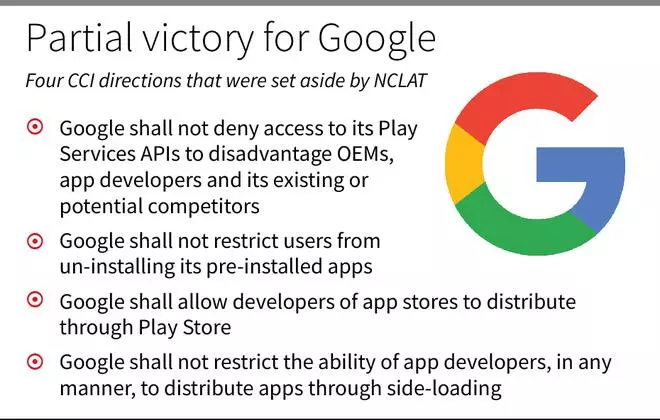In a significant ruling, the National Company Law Appellate Tribunal (NCLAT) on Wednesday upheld the penalty of ₹1337 crore imposed by the CCI on Google for its anti-competitive conduct in Android ecosystem. The appellate tribunal also set aside four of the Competition Commission of India’s (CCI’s) ten non-monetary directions issued against Google on October 20 last year in the Competition watchdog’s Android ruling.
Delivering the verdict in the Android appeal case, the NCLAT Bench comprising Ashok Bhushan, Chairperson and Alok Srivastava, Member (Technical), has in its 189 pages order given 30 days time for the tech giant to pay the fine and implement the order.
While Google said, “We are grateful for the opportunity given by the NCLAT to make our case. We are reviewing the order and evaluating our legal options”, Union Minister Rajeev Chandrashekhar stated that the judgment is a cautionary message to all platforms and companies. “India’s digital nagrik rights must be respected and any anti-competitive or anti-consumer practices will be a violation of the Indian competition law,” he said.
“Dominant Player”
NCLAT has largely confirmed the Competition Commission of India’s order of October 20 last year against Google. NCLAT has found that Google is a dominant player and has abused its dominant position by imposing various restrictions under its agreements with original equipment manufacturers (OEMs)—MADA, RSA and AFA.
Also read: CCI’s investigation arm conducting inquiries against several Big Tech firms, Govt tells Rajya Sabha
The four directions set aside related to allowing users to uninstall the preloaded apps, allowing sideloaded apps, sharing of APIs and allowing of third party app stores in Play Store.
NCLAT has set aside the CCI’s direction on allowing third party Apps store in Play Store. CCI direction to allow un installation of google apps has also been set aside. Further, the CCI directions to Google to give its API to third party is also set aside.
Six directions that stay
The six non-monetary directions that Google will have to comply with in the next 30 days are: OEMs shall not be restrained from (a) choosing from Google’s proprietary applications to be pre-installed and should not be forced to pre-install a bouquet of applications and (b) deciding the placement of pre-installed apps on their smart devices; licensing of Play Store to OEMs shall not be linked with the requirement of pre-installing Google applications; Google shall not offer any monetary/other incentives to, or enter into any arrangement with, OEMs for ensuring exclusivity for its search services.
Google shall also not impose anti-fragmentation obligations on OEMs, OEMs should be permitted to manufacture/ develop Android forks based smart devices for themselves. Additionally, Google shall not incentivise or obligate OEMs for not selling smart devices based on Android forks; and it shall allow users, during the initial device set-up, to choose their default search engine for all search entry points.
While NCLAT hearing in this Android appeal case began from February 15, the appellate tribunal had reserved the judgement in this matter on March 20.
NCLAT had on January 4 refused to grant any interim relief to Google. The matter then went to Supreme Court, which also denied relief to the company. However, the Supreme Court had requested the NCLAT to decide the matter by March 31. The NCLAT order of Wednesday came just two days before the deadline expires.
The Android appeal case before the NCLAT is a high-profile legal battle that has been ongoing for several years. The case centres around allegations of anti-competitive practices by Google, particularly in relation to its Android operating system.
It is an important legal battle that highlights the issue of anti-competitive practices by tech giants such as Google.
Also read: CCI approves LIC MF’s acquisition of management rights of IDBI MF schemes
The case is significant not just for India, but for other countries as well, as it underscores the need for strong competition laws that can keep pace with rapidly evolving technology markets.
Other countries may also look to follow India’s lead in scrutinising the practices of big tech companies. Google, for its part, has faced similar allegations of anti-competitive practices in other jurisdictions, including the European Union and the United States.

STORY SO FAR
It maybe recalled that Google had on January 24 this year filed an application before the NCLAT seeking an expedited hearing in the Android matter to ensure its timely disposal in line with the directions of the Supreme court.
While declining to interfere with the NCLAT order of January 4 in the CCI’s Android ruling, the Supreme Court had on January 19 in its ruling directed the Appellate Tribunal to dispose of Google’s appeal by March 31.
The apex court had declined to grant stay on the ten non-monetary directions issued by CCI in its October 20 ruling last year. The Court had, however, extended the period of compliance on CCI’s ruling on Android matter by another week, and this expired on January 26.
NCLAT, had on January 4, in the Google appeal matter declined to give an interim stay against the CCI ruling of October 20 last year and agreed to admit appeal on pre-deposit of 10 per cent of overall penalty of ₹1,337 crore. Google has since paid the 10 per cent of the penalty amount. Google went in appeal before SC against this NCLAT order that refused an interim stay.
Google contended that NCLAT had erred in summarily rejecting its request for a stay on the ten non-monetary directions (remedial directions) on an inadequate and unjustifiable reason. Tech giant had contended that the Tribunal had erred in making the admission of the Google’s NCLAT appeal against the CCI’s order subject to a pre-deposit amount.








Comments
Comments have to be in English, and in full sentences. They cannot be abusive or personal. Please abide by our community guidelines for posting your comments.
We have migrated to a new commenting platform. If you are already a registered user of TheHindu Businessline and logged in, you may continue to engage with our articles. If you do not have an account please register and login to post comments. Users can access their older comments by logging into their accounts on Vuukle.